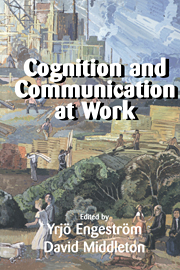Book contents
- Frontmatter
- Contents
- Contributors
- Acknowledgments
- 1 Introduction: Studying work as mindful practice
- 2 Distributed cognition in an airline cockpit
- 3 Constituting shared workspaces
- 4 Seeing as situated activity: Formulating planes
- 5 Convergent activities: Line control and passenger information on the London Underground
- 6 Users and designers in mutual activity: An analysis of cooperative activities in systems design
- 7 System disturbances as springboard for development of operators' expertise
- 8 Expert and novice differences in cognition and activity: A practical work activity
- 9 The tensions of judging: Handling cases of driving under the influence of alcohol in Finland and California
- 10 Talking work: Argument, common knowledge, and improvisation in teamwork
- 11 The collective construction of scientific genius
- 12 Experience and the collective nature of skill
- 13 Working together: Symbolic interactionism, activity theory, and information systems
- 14 On the ethnography of cooperative work
- Index
14 - On the ethnography of cooperative work
Published online by Cambridge University Press: 05 June 2012
- Frontmatter
- Contents
- Contributors
- Acknowledgments
- 1 Introduction: Studying work as mindful practice
- 2 Distributed cognition in an airline cockpit
- 3 Constituting shared workspaces
- 4 Seeing as situated activity: Formulating planes
- 5 Convergent activities: Line control and passenger information on the London Underground
- 6 Users and designers in mutual activity: An analysis of cooperative activities in systems design
- 7 System disturbances as springboard for development of operators' expertise
- 8 Expert and novice differences in cognition and activity: A practical work activity
- 9 The tensions of judging: Handling cases of driving under the influence of alcohol in Finland and California
- 10 Talking work: Argument, common knowledge, and improvisation in teamwork
- 11 The collective construction of scientific genius
- 12 Experience and the collective nature of skill
- 13 Working together: Symbolic interactionism, activity theory, and information systems
- 14 On the ethnography of cooperative work
- Index
Summary
Psychological research into cooperative work is still in its infancy as far as the emergence, usage, and extension of shared forms of thinking, special languages, and group-specific forms of action are concerned. What we have at present is a multitude of laboratory studies of small groups, and a growing number of field research reports like those in the other chapters of this book. Nearly all ethnographic studies that I am aware of have been done in the United States, Great Britain, or Scandinavia. I will not attempt a complete review of those studies here. Rather I shall aim first at explaining why this recent research looks new and exciting for many German readers, concentrating on the reasons for and the results of using qualitative methods, which is still quite unusual in German industrial psychology (but see Haug et al., 1987; Senghaas-Knobloch & Volmerg, 1990). Then I will go on to present a sketch of the concept of “semiotic self-regulation of groups.” After analyzing two paradigm cases for ethnographic work research, I offer some closing remarks about historical and possible future links between developmental work research (see Engestrom, 1987, and chapters by Engestrom and Norros, this volume) and the traditions variously called “naturalistic research,” “symbolic interactionism,” or “cognitive ethnography” (see Hammersley, 1989 for a short history).
A first view of the ethnographic approach
My first theme is to examine the applications of methods widely used in ethnology and cultural anthropology in psychological studies of the social regulation of work practices.
- Type
- Chapter
- Information
- Cognition and Communication at Work , pp. 319 - 340Publisher: Cambridge University PressPrint publication year: 1996
- 14
- Cited by



